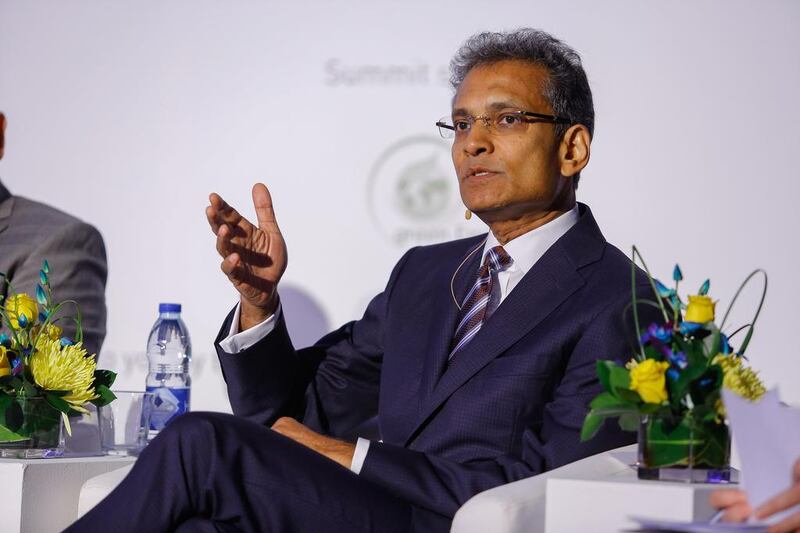RIYADH // Saudi Arabia’s Acwa Power is well placed to take part in the privatisation of key state-owned utilities including the Saudi Electricity Company (SEC).
Acwa also wants to take part in the kingdom’s privatisation of Saline Water Conversion Corporation, which desalinates water and operates power stations, which is likely to take place next year, said Paddy Padmanathan, Acwa’s chief executive.
“SEC and saline water conversion company privatisation, they are all of great interest for us and we very much like to participate and secure our share,” said Mr Padmanathan in an interview in Riyadh.
Saudi Electricity will be broken up into four power companies as part of plans to reform the sector and the process is expected to begin by the end of the year, according to Mr Padmanathan.
Saudi Arabia is planning to sell off state assets in several sectors to generate a new revenue stream, improve efficiency and reduce government spending on infrastructure. The world’s biggest oil exporter wants to wean itself off oil income by 2030 as part of a vision fleshed out by Deputy Crown Prince Mohammad bin Salman last year.
Acwa, in which Saudi Arabia’s main sovereign wealth fund, Public Investment Fund, has a stake, wants to reap benefit from the kingdom’s new reform drive. It expects to double its assets to US$70 billion in three years as it snaps up projects in Saudi Arabia, which is venturing into renewables and also the wider Mena region.
Saudi Arabia, which wants to free up fossil fuels used in power plants for export, plans to invest up to US$50 billion to help meet its target of producing enough electricity from renewables to power the equivalent of three million homes within six years, the country’s oil minister said in February.
“Given the opportunity in the kingdom and also in the markets that we operate in – half of my business is here and half is outside – we see an opportunity to double our size within three years,” said Mr Padmanathan.
Acwa has a $35bn portfolio of power and water assets.
Riyadh-based Acwa wants to bid for the kingdom’s first renewables power projects: a 300 megawatt solar power plant and a 400MW wind project.
“We are pre-qualified for both [solar and wind],” said Mr Padmanathan. “We have received RFP [request for proposal] for solar. We are preparing the tender and when the wind tender comes we will prepare [for it].”
The Saudi government has set a target of generating 9.5 gigawatts of electricity from renewables by 2023 and will eventually generate 70 per cent of its electricity from gas – up from about 40 per cent in 2014 – and the remainder from renewables and other sources.
Out of Acwa’s 24,000MW portfolio, about 9,500MW are in the kingdom.
Mr Padmanathan expects new capacity in the kingdom to be mostly in renewables, where prices are competitive. “75,000MW we have today [in installed capacity in the kingdom] and more than half of it needs to be replaced,” he said. “We will continue to build fossil fuel plants, gas mostly, but it will be for replacement of exiting assets, rather than for new capacity. I think you will find when replacements start happening that there will be more renewables, just in keeping with the world.”
In March, Abu Dhabi achieved a record-low bid for electricity generated by solar power in a deal with an Asian consortium.
“I absolutely expect on a like-for-like comparison the price of the kingdom will be lower because the credit conditions are better and it is a bigger market,” said Mr Padmanathan.
To meet its funding needs for all these projects, Acwa issued a $814 million bond this month and plans to tap the bond market possibly later this year and also early next year, potentially for sukuk.
As for its much talked about flotation on a stock exchange, it is likely to take place in the latter part of next year, he said.
dalsaadi@thenational.ae
Follow The National's Business section on Twitter





